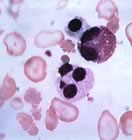|
Thalassaemia
DID YOU KNOW 1 IN 7 ASIANS ARE
CARRIERS?
 |
|
 |
 |
| |

Thalassaemia is a common gentic blood
disorder found amongst
the Asian Community
 |
|
Thalassaemia is a common genetic blood disorder found amongst the
Asian communities, it can have a devastating impact upon you and
your future family. Emphasis is needed on preconception testing
(testing before planning a family) to determine if you are a healthy
carrier of Thalassaemia.
If you and your future/current partner are found to be Carriers then
you should know before planning a family what Thalassaemia is and
how to arrange for early testing in a pregnancy to see if the baby
has Thalassaemia Major.
What is Thalassaemia
Thalassaemia is a genetic blood disorder that is inherited from
parents. There are two forms, Thalassaemia Carrier (also known
as Thalassaemia
Minor or Trait) and Thalassaemia Major. Being a Thalassaemia Carrier
causes no ill health but when two people who are Thalassaemia
carriers have a child, there is a 25% chance at each pregnancy
that they
will have a baby with Thalassaemia Major.
Thalassaemia Major is a serious blood disorder where the baby
is unable to produce enough red cells in the blood. Without treatment,
this
child eventually dies. With treatment, the child is able to grow
and become an adult but faces many health complications. There
is no safe
and effective cure for Thalassaemia.
How is Thalassaemia Major treated?
At present the treatment consists of blood transfusions in hospital
every month and using a ‘continuos’ injection for 8-12
hours each night at home. Despite treatment, the Thalassaemia Major
sufferer may face many health complications like diabetes, growth
and sexual development problems and heart problems.
The treatment is life long and there is no safe and effective cure
for Thalassaemia. On rare occasions, a bone marrow transplant may
be helpful.
Who may be carriers?
In the UK, the Muslim community from the Indian sub-continent is at
risk. It is estimated that up to 1 in 7 may be carriers. If you
or your family originate from Pakistan, India, Bangladesh or Sri
Lanka, you may be at risk of being a carrier of Thalassaemia.
Some communities have a higher incidence than others.
1/7 to 1/10 Gujeratis
1/10 for Sindis
1/20 for S. Indians
1/25 for Pakistanis
1/15 to 1/30 for Punjabis & Bangladeshis
How can I be tested?
A very simple procedure were a small sample of your blood is taken
and sent to a laboratory. The result is usually obtained very
quickly. Ask your GP or family planning clinic to arrange for
the Thalassaemia
blood test – ‘Haemoglobin Electrophoresis’.
Please get the blood test done as soon as possible and before
you plan a
family.
For further information please contact the UK Thalassaemia Society
on 020 8882 0011 or visit their website at www.ukts.org
DIAGRAM OF DISTRIBUTION OF THALASSAEMIA IN SUB-CONTINENT |



